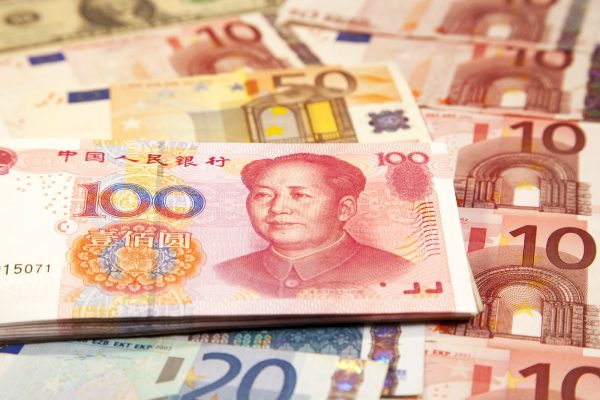Under Xi Jinping’s leadership, China has more aggressively sought to establish its currency power abroad, creating growing competition with the U.S. dollar. While analysts claim the yuan is unlikely to challenge, let alone overtake, the U.S. dollar’s reach anytime soon, it has won some victories in key battlegrounds in recent months.
On August 30, the Bank of China announced the “first direct investment in yuan in Argentina,” part of China’s promotion of the yuan as an alternative currency for international trade. The yuan has now been used in a number of countries for investment and lending purposes, in place of the U.S. dollar.
However, China had previously not been able to reach the Latin American subcontinent, which for centuries has served as the United States’ area of geopolitical influence and monetary dominance. In April, Argentina signed a currency swap deal allowing the government in Buenos Aires to use the yuan to finance various public projects, including transport infrastructure, electricity, mining, and energy projects.
Argentina’s dollar reserves have been dwindling due to currency mismanagement and overspending, and with the Argentine peso’s value always in flux, the yuan was Argentina’s new best option.
Marcos Falcone, a political scientist with the Fundación Libertad, a think tank based in Rosario, Argentina, told The Diplomat that China’s strategy for Argentina “reflects a broader pattern of providing financial help to countries in need when they are out of options.”
Argentina is also now able to pay for foreign imports, including from China, with yuan currency – up to $18 billion worth for the next three years. Argentina also paid its June debt payment to the International Monetary Fund in yuan. Chinese banks, including the Industrial and Commercial Bank of China (ICBC), have been allowed to operate throughout the country, with several ICBC branches opening in the last few months.
Their billboards can be seen along the Avenida 9 de Julio, the capital’s central commercial artery. The Chinese banks were allowed by the Argentine Central Bank to open customer accounts using Chinese currency back in June. Customers can also make savings deposits and pay debt in yuan. Journalist Ignacio Olivera Doll, for Bloomberg and the Buenos Aires Times, said that the trend “highlights both Argentina’s dire financial situation and China’s ambitions for its currency.”
In response, Falcone, himself from Argentina, argued that “nobody in Argentina is seriously thinking that people will actually open bank accounts in yuan or that the currency will circulate alongside pesos or dollars.” He added that “the government has only signed agreements with China because of the dire economic situation it finds itself in.”
China’s monetary reach in Argentina could still face limits. A presidential election is scheduled for October 22, and Javier Milei, the surprise current frontrunner from the libertarian-aligned right, has promised to dollarize the Argentine economy as soon as he enters office.
Milei has also expressed vehement opposition to Chinese influence in Argentina and South America and wants to make Argentina much closer to the U.S. financially and geopolitically. Last month, Milei told Bloomberg that he would “not promote political relations with communist countries,” in reference to China.
Therefore, though recent policies show the extent of China’s new monetary influence in Argentina, this could very well be short-lived.
A potentially greater and more sustainable win for China is the yuan’s growing reach in Argentina’s neighbor, Brazil. On August 31, Tatiana Prazeres, Brazil’s Foreign Trade Secretary, wrote on her LinkedIn account that while 90.5 percent of Brazil’s international commerce continues to be in dollars, “the use of other currencies is growing.” She added, “the Renminbi increases a lot as a declared currency of our imports.”
Her statement reflects President Luiz Inácio Lula da Silva’s bid to diversify the country’s use of currencies, in which China has played an important role. Lula, Prazeres, and others in Brasília have taken a number of steps to increase the yuan’s presence in Brazil.
The article that Prazeres shared with her LinkedIn post, from the journal Valor Econômico, claims that the yuan is used for only 0.4 percent of Brazil’s imports and exports, but that “measures recently announced by President Lula can boost the yuan.” That would be an understatement. Prazeres, who worked as a fellow with the Beijing-backed Center for China and Globalization and has contributed to other Chinese think tanks, has taken steps to integrate China into the Brazilian and Latin American financial system.
In April, the Brazilian government signed a currency swap deal with China, completely dropping the U.S. dollar as an intermediary. At the signing ceremony in Shanghai, Lula criticized the dollar’s global financial dominance, saying, “Why should every country have to be tied to the dollar for trade?… Who decided the dollar would be the (world’s) currency?”
As well as serving as a criticism of the extraterritorial power granted to Washington by the U.S. dollar’s reserve status, Lula’s statement also served as a defense of his government’s recent financial rapprochement with China.
In April, Lula visited Beijing and Shanghai, where a variety of agricultural, trade, and financial deals were signed. In late August, his government offered to Argentina that it would guarantee bilateral exports in yuan rather than in U.S. dollars.
The deal, which is meant to maintain a constant flow of exports from Brazil to Argentina despite cash shortages, is a win for China. The Banco do Brasil, Brazil’s largest bank, was also made the sole commercial purveyor of the Chinese yuan in Brazil, which will be used to finance public projects and trade with other countries including China.
The U.S. and other Western governments have been critical of the Lula government’s posturing on China, with many analysts signaling that Brazil can no longer be trusted to advance U.S. geopolitical interests in the region. At the time of Lula’s visit to China, John Kirby, the National Security Council spokesperson, said publicly that Brazil is “parroting Russian and Chinese propaganda without at all looking at the facts.”
Brian Winter, the editor-in-chief at Americas Quarterly, commented for CNN Brasil last week that the U.S., due to ideological disagreements over Lula’s approach to China, Russia, and leftist authoritarian governments in the Americas, may no longer treat Brazil as an ally, but “more as a partner.”
Surprisingly, the Brazilian opposition has not pushed back on Lula’s rapprochement with China. Ricardo Salles, a rising deputy with Jair Bolsonaro’s Liberal Party, condoned the trip for expanding the business ties between Brazil and China. Tarcísio de Freitas, the governor of the state of São Paulo, who is set to become Bolsonaro’s replacement, has also praised the move, saying that he was “impressed” with the outcome and that improving relations between Beijing and Brasilia would bring “more Chinese investment to Brazil.”
The ICBC has also extended its presence in Brazil, after it was approved as the country’s only yuan-clearing bank in February. It is also able to distribute yuan for trade and investment deals, and some customer transactions in Chinese currency are possible with the ICBC in Brazil. For example, ICBC Brasil provides yuan-denominated student loans for Brazilians wishing to study in China. A memorandum supporting ICBC savings and commercial banking branches in Brazil was issued by the Bank of China in February.
On March 31, the yuan became the second-largest currency in Brazil’s foreign reserves after the dollar, taking over the euro. Yuan foreign reserves in Brasília continue to grow, with the U.S. share decreasing slowly. Five years prior, Brazil had no foreign reserves in yuan at all.
While the dollar is still the dominant currency in both Brazil and Argentina, the current governments have made clear, both through their policies and their rhetoric, their intent to include the yuan in financial and commercial dealings, to the benefit of China’s global financial influence. Whether upcoming elections in Argentina and global opposition to Brazil’s tilt toward Beijing help slow down this trend remains to be seen.





















Discussion about this post